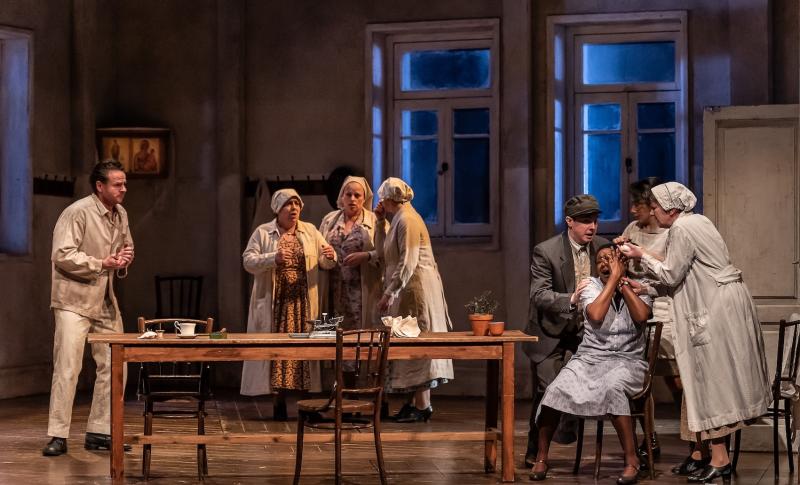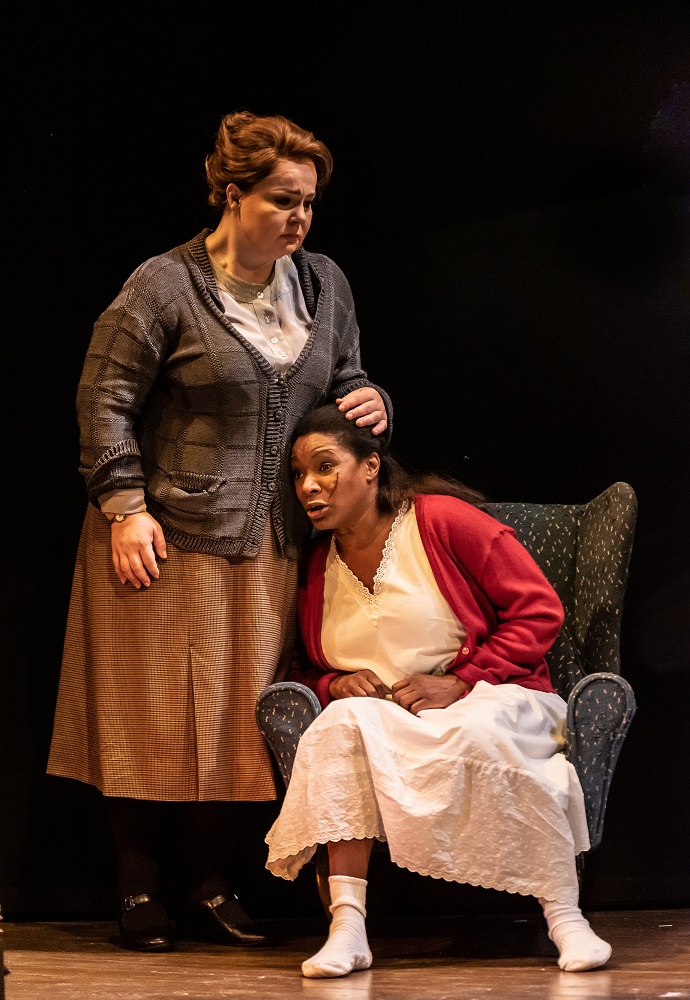Jenůfa, Welsh National Opera review - powerful drama with a kitsch tailpiece | reviews, news & interviews
Jenůfa, Welsh National Opera review - powerful drama with a kitsch tailpiece
Jenůfa, Welsh National Opera review - powerful drama with a kitsch tailpiece
Taut, stylish Janáček marred by annoying details

If like me you regard the ending of Janáček’s Jenůfa as one of the most moving scenes in all opera, you might care to consider how it would be possible to deflate it in spite of the best singing imaginable.
No surely: too kitsch by half! But that is precisely what happens in the WNO revival of Katie Mitchell’s 24 year-old production, directed now by Eloise Lally. The good news is that, though ruinous in itself, this little coup de théâtre is untypical. The production has annoying features, but is mostly taut and stylish, strong on atmosphere, with idiomatic designs by Vicki Mortimer and an incisive focus on character, which is really the heart of Janáček’s masterpiece.
I remain at a loss to understand why Mitchell – like some other directors – sets the first act indoors in what looks like the mill office, with officious-looking people coming and going more or less irrelevantly, where not only the action but the music (all that brilliant dancing etc) positively screams for an outdoor setting. For some reason opera directors hate, or fear, the open air. But when it comes to something essentially interior, like Jenůfa’s second act, they are in their element: a chair, a table and a lamp, with a wedding dress on a mannequin behind, all you need to present this devastating scene of misery and despair, wrapped up in music of such intensity and beauty.
 They now sing Jenůfa in Czech in Cardiff, and perhaps accurately – I couldn’t possibly comment. But in any case they sing it extremely well. Elizabeth Llewellyn, in the title role, took time (at this second performance) to find what Michael Flanders called the pitch of the hall, but once she got going she was superb, especially in the horrifying scene that culminates in the Kostelnička’s abduction and murder of Jenůfa’s week-old baby, and in that overwhelming final duet with Laca. It must be said that she moves awkwardly onstage, gauchely in the first act, almost too painfully post-natal in the second. Jenůfa is a tragic figure, not a pathetic one. But these are details.
They now sing Jenůfa in Czech in Cardiff, and perhaps accurately – I couldn’t possibly comment. But in any case they sing it extremely well. Elizabeth Llewellyn, in the title role, took time (at this second performance) to find what Michael Flanders called the pitch of the hall, but once she got going she was superb, especially in the horrifying scene that culminates in the Kostelnička’s abduction and murder of Jenůfa’s week-old baby, and in that overwhelming final duet with Laca. It must be said that she moves awkwardly onstage, gauchely in the first act, almost too painfully post-natal in the second. Jenůfa is a tragic figure, not a pathetic one. But these are details.
For powerful presence one turns to Eliška Weissová’s Kostelnička (pictured above with Llewellyn), a moral force expressed in music and posture, yet a strangely sympathetic figure, doomed like all those who try to play God with lofty motives. Surely no composer – not even Wagner – has captured that quality more precisely than Janáček, and one could feel Weissová relishing it as if the part had been written for her. In a similar way Peter Berger teased out cleverly the subtle change that comes over Laca’s character after he has slashed Jenůfa’s face – another brilliant achievement of this score, with its speech patterns constantly picked up in the orchestra.
But this is generally an excellent cast, with Rhodri Prys Jones finding something almost likeable in the deeply unattractive character of Števa, and a whole series of sharp vignettes, including Sian Meinir's downtrodden Grandmother Buryja, Sion Goronwy’s seven-foot high, three-foot wide Mayor, and Francesca Saracino’s ghastly Karolka, just Števa’s type but not if he’s saddled with a dead bastard, thank you very much. The author of the original play, Gabriela Preissova, had lived among the sort of people she wrote about, and something of her vivid realism comes out also in Janáček’s minor characters, which may be one reason why British companies, often so strong in depth, play him so well.
Tomáš Hanus conducts, inclining at first to overpower the singers, but gradually finding the necessary balance of full orchestra and conversational dialogue. I’ve heard this orchestra and chorus in tidier form, but that’s only because of the extraordinarily high standards they set themselves. This is a welcome revival that deserves stronger audience support.
Add comment
The future of Arts Journalism
You can stop theartsdesk.com closing!
We urgently need financing to survive. Our fundraising drive has thus far raised £49,000 but we need to reach £100,000 or we will be forced to close. Please contribute here: https://gofund.me/c3f6033d
And if you can forward this information to anyone who might assist, we’d be grateful.

Subscribe to theartsdesk.com
Thank you for continuing to read our work on theartsdesk.com. For unlimited access to every article in its entirety, including our archive of more than 15,000 pieces, we're asking for £5 per month or £40 per year. We feel it's a very good deal, and hope you do too.
To take a subscription now simply click here.
And if you're looking for that extra gift for a friend or family member, why not treat them to a theartsdesk.com gift subscription?
more Opera
 Orpheus and Eurydice, Opera Queensland/SCO, Edinburgh International Festival 2025 review - dazzling, but distracting
Eye-popping acrobatics don’t always assist in Gluck’s quest for operatic truth
Orpheus and Eurydice, Opera Queensland/SCO, Edinburgh International Festival 2025 review - dazzling, but distracting
Eye-popping acrobatics don’t always assist in Gluck’s quest for operatic truth
 MARS, Irish National Opera review - silly space oddity with fun stretches
Cast, orchestra and production give Jennifer Walshe’s bold collage their all
MARS, Irish National Opera review - silly space oddity with fun stretches
Cast, orchestra and production give Jennifer Walshe’s bold collage their all
 Káťa Kabanová, Glyndebourne review - emotional concentration in a salle modulable
Janáček superbly done through or in spite of the symbolism
Káťa Kabanová, Glyndebourne review - emotional concentration in a salle modulable
Janáček superbly done through or in spite of the symbolism
 Buxton International Festival 2025 review - a lavish offering of smaller-scale work
Allison Cook stands out in a fascinating integrated double bill of Bernstein and Poulenc
Buxton International Festival 2025 review - a lavish offering of smaller-scale work
Allison Cook stands out in a fascinating integrated double bill of Bernstein and Poulenc
 Tosca, Clonter Opera review - beauty and integrity in miniature
Happy surprises and a convincing interpretation of Puccini for today
Tosca, Clonter Opera review - beauty and integrity in miniature
Happy surprises and a convincing interpretation of Puccini for today
 Hamlet, Buxton International Festival review - how to re-imagine re-imagined Shakespeare
Music comes first in very 19th century, very Romantic, very French operatic creation
Hamlet, Buxton International Festival review - how to re-imagine re-imagined Shakespeare
Music comes first in very 19th century, very Romantic, very French operatic creation
 Falstaff, Glyndebourne review - knockabout and nostalgia in postwar Windsor
A fat knight to remember, and snappy stagecraft, overcome some tedious waits
Falstaff, Glyndebourne review - knockabout and nostalgia in postwar Windsor
A fat knight to remember, and snappy stagecraft, overcome some tedious waits
 Salome, LSO, Pappano, Barbican review - a partnership in a million
Asmik Grigorian is vocal perfection in league with a great conductor and orchestra
Salome, LSO, Pappano, Barbican review - a partnership in a million
Asmik Grigorian is vocal perfection in league with a great conductor and orchestra
 Semele, Royal Opera review - unholy smoke
Style comes and goes in a justifiably dark treatment of Handelian myth
Semele, Royal Opera review - unholy smoke
Style comes and goes in a justifiably dark treatment of Handelian myth
 Le nozze di Figaro, Glyndebourne review - perceptive humanity in period setting
Mostly glorious cast, sharp ideas, fussy conducting
Le nozze di Figaro, Glyndebourne review - perceptive humanity in period setting
Mostly glorious cast, sharp ideas, fussy conducting
 Fidelio, Garsington Opera review - a battle of sunshine and shadows
Intimacy yields to spectacle as Beethoven's light of freedom triumphs
Fidelio, Garsington Opera review - a battle of sunshine and shadows
Intimacy yields to spectacle as Beethoven's light of freedom triumphs
 Dangerous Matter, RNCM, Manchester review - opera meets science in an 18th century tale
Big doses of history and didaction are injected into 50 minutes of music theatre
Dangerous Matter, RNCM, Manchester review - opera meets science in an 18th century tale
Big doses of history and didaction are injected into 50 minutes of music theatre

Comments
I have to say that end image
I have to say that end image sounds attractive to me - though it depends entirely on how it looks...KM is not naturally an over-sentimental or kitschy director. I love the idea that in author Preissova's novel, our couple do have a child and welcome the stepmother back into the family when she's released from prison.
The Kostelnicka in the
Quite right, my mistake. But